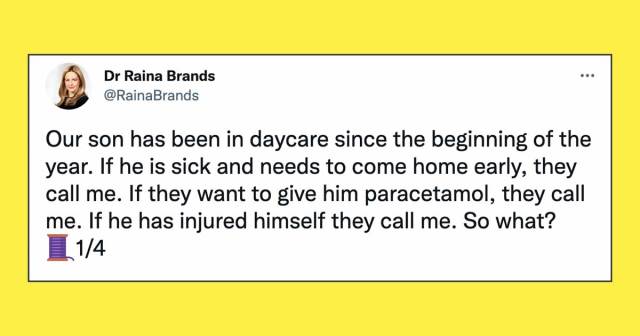What came first—the caregiver or the title of caregiver? One mom’s Tweet about how her child’s daycare continues to call her despite her husband being listed as the primary point of contact has kicked off quite the Twitterverse discussion about gender roles in parenting, instances of bias and how that bias, in turn, affects gender roles (not to mention careers).
Our son has been in daycare since the beginning of the year. If he is sick and needs to come home early, they call me. If they want to give him paracetamol, they call me. If he has injured himself they call me. So what? 🧵1/4
— Dr Raina Brands (@RainaBrands) March 2, 2022
Dr. Raina Brands took to Twitter to air her frustration about being the primary point of contact for her son’s daycare, despite filling out all the forms with her husband’s information. He drops her son at daycare, picks him up, has his name and number on all the contact-in-case-of forms, and yet Brands is the one who gets every call. Why? Because she’s the mom.
I have repeatedly asked them to call my partner first. I have asked them to put a note on my file about that. I have asked the manager. Today they called and I asked them to always call my partner first and 2 hours later THEY CALLED ME AGAIN. What makes this more absurd is.. 2/4
— Dr Raina Brands (@RainaBrands) March 2, 2022
…the fact that my partner has always been the main point of contact! He filled out all of the forms, he did all of the settling-in sessions, and he drops our son off every morning. But they are incapable of viewing him as a primary caregiver. (3/4)
— Dr Raina Brands (@RainaBrands) March 2, 2022
Since posting, Brands has received nearly 21k likes, plus hundreds of retweets and comments. Moms everywhere—and dads—have experienced a similar sort of gender stereotyping when it comes to childcare, despite their best efforts to clearly indicate which parent should be the primary contact.
I had exactly the same experience, until I “accidentally” put my husband’s phone number next to my name, now he gets all the calls 😎
— Theresa Kuhn (@TheresaJKuhn) March 2, 2022
As the stay at home dad with a breadwinning wife I’ve experienced this constantly too. I’ve never been able to get any doctor’s office, school, et cetera to actually call me first. It’s so ingrained culturally to call mom.
— SpaceDadDan (@Morgan628) March 4, 2022
Brands has a Ph.D. in management and is a professor at the UCL School of Management, where she directs an open-enrollment course on leading inclusively. BuzzFeed reached out to her after her Tweet went viral, and she had plenty of insight to share. “I research gender inequality in organizations, as well as teach and consult on this topic. We focus a lot on the major inequalities women face in their careers—the gender pay gap, the gender leadership gap, overt sexism, etc.,” she said. “But every day, women experience smaller inequalities as well, and these smaller inequalities add up over time. My daycare example is one of them.”
“One phone call isn’t a big deal,” she goes on. “But if every phone call goes to me, it means I am regularly being pulled away from my work to answer a query, arrange alternative care, pick him up, etc. The cumulative effect is an additional mental load and a time cost, not to mention … the potential to make me look unreliable and not seriously committed to my career. If they never call my partner, not only are we not sharing those costs, but it also means he gets sidelined as a parent.”
Not all responses to Dr. Brands’ Tweet were affirming. Like the one below, some people were offended that a mother—regardless of the structures she and her partner had put in place to best care for their child’s welfare, their individual careers and their family’s financial future—a mother! wouldn’t want to be called out of her workday to discuss her son’s runny nose, cranky mood, missing permission slip, etc., etc., etc.
How I miss the days when women actually wanted to be mothers. When caring for their children was their responsibility and something they took pride in. Not something they complained about on an open forum. Children NEED a mother to be maternal.
— Lindsay Askew (@LindsayAskew5) May 2, 2022
According to Brands, “gender inequality is self-reinforcing” in parenting because when teachers, doctors, other parents and other temporary caregivers just assume that the mom is the primary caregiver, all decisions—logistical, permissions-related, medical, social—are funneled to her. So despite a mom’s best effort to shoulder (or defer) the parenting burden to her partner, she ends up bearing the brunt of it.
And any parent will tell naysayers that not having the bandwidth to manage the minutiae of daily decision-making is very, very different from not loving your child. It simply means that your family’s caregiver structure is organized in a way that works for your family—and it’s clear that our culture just isn’t ready to wrap their heads (or organize their point-of-contact calls) around roles that don’t follow gender stereotypes.
RELATED STORIES
5 Ways the Expanding Roles of Dads Are Helping Moms
If We Want Good & Present Fathers, We Need to Expect It of Them
We’re Parents & Partners: How to Balance Both Roles at Once











